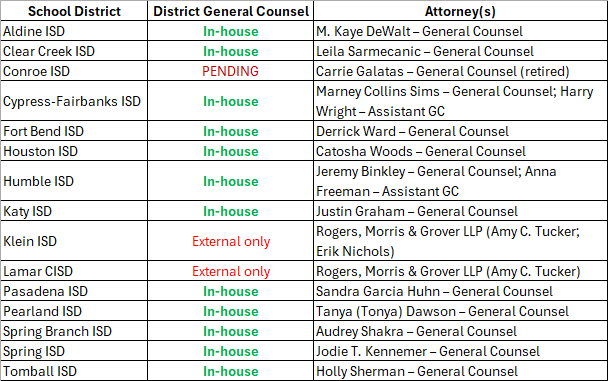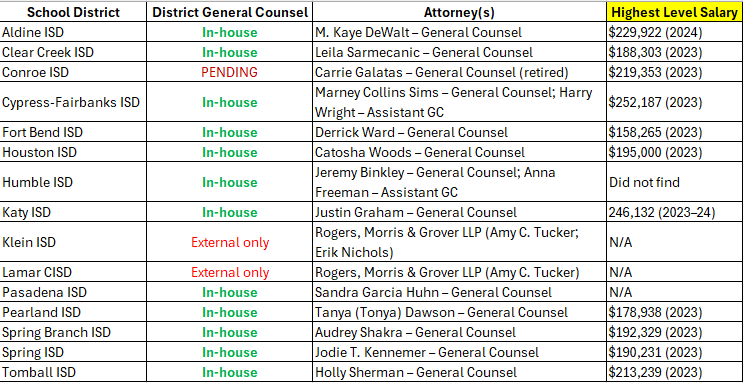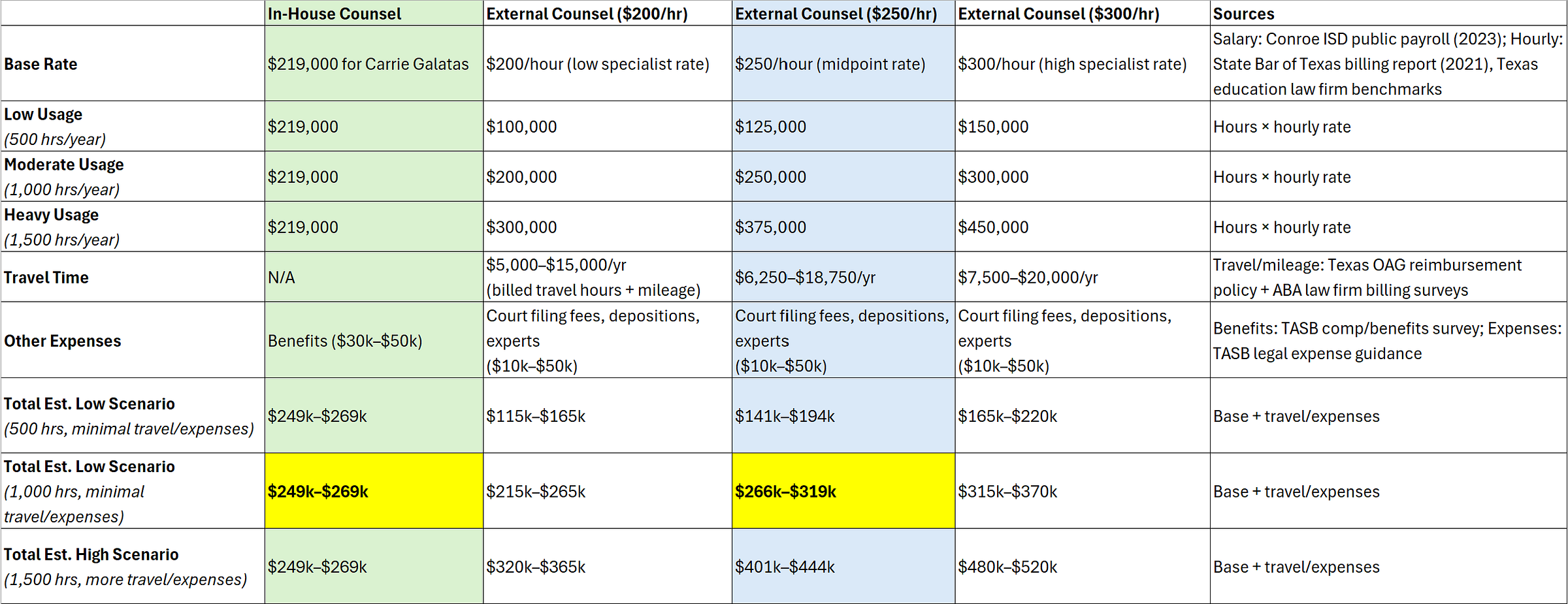School Board to Vote on Hiring Attorney with Conflicts of Interest
Upcoming policy and attorney changes allow the Conroe ISD School Board to spend untold amount of money on legal services for questionable counsel.
The Conroe ISD Board will be voting at the next meeting (August 19th) to change District policies to allow for hiring of outside legal counsel as ‘District General Counsel’, instead of hiring in-house counsel. This will likely cause the legal budget to balloon out of control as well as increase the conflict of interests found with our Board and their connections, which we will discuss.
The reason for these attorney changes begins with the retirement of our previous District in-house counsel, Carrie Galatas. I have questions regarding her retirement, which I am reviewing as it has curious timing with the Superintendent’s decision to also leave (as well as many admin and Principals across the District).
The Board’s goal, apparently, is to hire outside firm O’Hanlon Demerath & Castillo, and more specifically with attorney Kara Belew, who we will get to in a moment. Kara was introduced at the last meeting.
There are certainly pros and cons for a school district to outsource its legal department, but it becomes clear after looking at the data that in-house counsel is much more financially responsible for larger school districts like Conroe ISD.
Let’s start with which changes they are proposing.
Policy Changes
Those who follow me know I like to get into the weeds with policy, and luckily there are only two policy changes related to the changes with the attorney.
Note that for the next Board meeting they will be discussing changes to four other policies, which we will breakdown in another post.
Board Policy BDD (Local) - Board Internal Organization: Attorney
Here is the current language:
The Board shall employ an attorney to serve as the District's general counsel and representative in matters requiring legal services. The District's general counsel, on behalf of the Board, may retain a private attorney or firm to represent the District in legal matters involving an ethical conflict of interest for the general counsel or requiring specialized legal knowledge. Services to be performed and reasonable fees and expenses to be paid by the District to a private attorney or firm shall be set forth in an engagement letter between the Board and the attorney or firm.
Individual Trustees shall channel legal inquiries through the Superintendent or general counsel, as appropriate, when advice or information from the District's outside legal counsel is sought. The Board President may make legal inquiry to retained, outside legal counsel directly, when circumstances so require.
A staff request for legal advice from the District's outside legal counsel must be submitted through the Superintendent or general counsel.
They are proposing to completely do away with this language and adopt the following:
Enables the Board to retain either internal or external counsel for representing as ‘District General Counsel’
Introduces language regarding ‘Board General Counsel’, allowing the District’s General Counsel to also serve as the Board’s private attorney (if desired)
Clarifies points of contact as it relates to the District General Counsel and Board Counsel
Requires any legal advice to be shared with the full Board. This has been a point of contention recently where only certain Board members have been getting responses from the Board’s private attorney, including not receiving copies of invoices from their current private attorney1
This language has some good and bad changes, in my opinion. It is good that it better defines the role differences between the District Counsel and Board Counsel, and that any requests to the attorney from the Board are shared with the Board in its entirety.
The bad is that it now opens the door to external counsel for general district legal matters, which will become very expensive, as we’ll see below. It will also become clear that this will negatively impact things like Public Information Requests (PIRs) and overall Board transparency.
Board Policy CH (Local) - Purchasing and Acquisition
This policy does a few things:
Defines how the District buys or procures products or services
Sets the rules for purchasing and competitive procurement requirements
Requires that vendor costs over $50,000 must go through a competitive bidding process, as required by Texas law
Defines cooperatives or interlocal agreement processes, emergency purchase processes, and other related matters to purchasing.
The proposed changes do one thing:
Removes the requirement for costs over $50,000 to go through competitive bidding process.
At first glance my thought was the Board was removing this language so they can spend whatever they want on external counsel. However, after looking into this it does not appear to be related.
Recent Texas law changes, specifically SB 1173, raises the competitive-procurement trigger for school districts from $50,000 to $100,000 (effective Sept 1, 2025). The Board needs to update this policy to include more generic language, although removing it entirely is questionable.
Also note that legal services are not bound by that particular Texas law anyways, as certain professional services (e.g., attorneys, architects, engineers, CPAs) go through a different procurement process.
During the August 5th Special Meeting, the Board decided to table this one. We should know more at the August 19th Regular Meeting.
Comparing Districts
Do other school districts in Greater Houston use in-house counsel or external? Let’s find out:
Well, that answers that. Most school districts in Greater Houston, many at the same size or larger than Conroe ISD, employ an in-house attorney.
The reason is obvious, which is the economies of scale. School districts eventually hit a certain threshold where having an in-house attorney is more financially sound than contracting externally.
There are certainly benefits of going with external counsel, including having a wider range of expertise available within a law firm, which is still common when a district needs the help. But the overall costs increases are immense.
Consider all of the tasks that a school district attorney may provide:
Routine contract reviews
Employment disputes
Litigation prep/response, Parent lawsuits against the district
Special education compliance
Policy drafting
Open records requests
etc.
These are all completed by the in-house attorney based solely on their salary. External counsel will likely bill for everything, including:
Meeting prep and/or “getting up to speed”
Phone calls
Travel costs, including to Board meetings
Per diems
Emails
etc.
Cost Comparison
We can begin our cost comparison by looking at how much schools spend on in-house attorneys:
Using Conroe ISD as the sample, where Carrie Galatas made about $219K/year, let’s think about how much this will compare to external counsel. We will use a low/moderate/heavy usage approach, splitting out costs based on hourly attorney feeds that range from $200-$300/hour:
As you can see in the highlighted boxes, comparing in-house counsel to an external hourly rate midpoint ($250/hr), plus expenses, and then averaging that out across total work hours spent (average 1,000 hours a year, ~25hr/week in a school year), you get on average an increase in cost up to +$50,000/year.
You can buy a lot of books with that money.
And this assumes that we will not have events where more expensive attorneys from the same firm are needed, such as those who charge $300/hr+ or how much it will cost the attorney to travel to meetings.
Assuming Kara Belew is the attorney, my quick search shows she is based in Austin. Doing some side math estimates the District may get billed $1,500-$2,000/month just for her travel.2
We are going to pause on the cost discussion so we can step back and research more on the pros and cons of external counsel.
Benefits of External Counsel
Let’s play devil’s advocate. What are the benefits of external counsel? We’ll ask the AI to save time:
Specialized Expertise on Demand – Quickly bring in attorneys with deep knowledge of niche areas like special education law, construction disputes, bond financing, or complex employment cases.
Scalable Staffing – Access to a full firm’s resources, meaning multiple lawyers can work on a matter if needed, without the district hiring more staff.
Flexibility in Engagement – Only pay for legal work when it’s needed; no ongoing salary or benefits obligation.
Easier to Replace – If dissatisfied, the district can change law firms without the HR and political challenges of removing an employee.
Broader Perspective – Outside counsel often works with many districts, giving them exposure to trends, strategies, and pitfalls from across the state.
Capacity for Large Cases – A firm can quickly add attorneys and paralegals to manage time-intensive litigation or emergencies.
Separation from Internal Politics – Being outside the organization can allow counsel to provide more independent, less politically influenced advice.
These all sound like great ideas. What are the downsides?
Cost & Budget - External legal support can lead to unpredictable and escalating costs due to hourly billing, travel expenses, and duplicated effort on recurring matters.
Speed & Availability - External advisors aren't embedded in daily operations, which can slow down urgent decision-making and limit availability during critical times.
Knowledge & Continuity - Firms may lack deep familiarity with your organization, requiring repeated context ramp-up and risking disruption from staff turnover.
Risk, Governance & Ethics - Potential conflicts of interest and billable hour incentives can skew advice, while extra safeguards are needed for data privacy and compliance.
Operational Friction & Optics - Coordination challenges and limited access to internal systems can slow routine processes and create inefficiencies.
The Attorney, Kara Belew
The real kerfuffle with the District’s attorney changes is related to who this attorney is. I do not know and have not met Kara Belew. I will note her resume is impressive and I can only assume she is a competent attorney. On any normal day I do not believe anyone would have an objection to her or the law firm O’Hanlon, Demarth & Castillo to represent the school district.
There is only one other school district in Texas (that I can find) that contracts with Kara Belew or O'Hanlon, Demerath & Castillo, which is Midland ISD.
However, there is one interesting note in her profile:
Kara is a co-founder of Texans for Excellence in Education (TEE), a nonprofit organization dedicated to helping school boards implement evidence-based policies that drive student success, strengthen accountability, and expand access to high-quality education across Texas. Through TEE, she champions systemic reforms, fosters innovation, and empowers boards to lead with clarity and purpose.
And this note from the TEE website:
Texans for Excellence in Education Welcomes Kara Belew to the Board of Directors
Fort Worth, TX – Texans for Excellence in Education (TEE) is pleased to announce the addition of Kara Belew to its Board of Directors. Kara brings over 20 years of experience in education policy and public administration, including service to two governors of the State of Texas.
You may remember our recent post regarding TEE:
Here’s the AI summary:
Texans for Excellence in Education (TEE) is a newly formed organization incorporated in Delaware with no physical Texas office, minimal transparency, and leadership lacking clear educational credentials. While it claims to offer the same breadth of services as the long-established Texas Association of School Boards (TASB) at half the cost, many of its offerings appear incomplete or “vaporware.” Critics note missing policy tools, unsecured training portals, and a lack of the economies of scale TASB provides for purchasing and risk management. A Texas Education Agency records request reportedly found no recognition of TEE or its consultants as authorized board trainers.
The group is also entangled in political controversies, with leadership tied to politically active individuals who have been involved in contentious school board races, ethics violations, and the spread of false election claims. TEE has been linked to divisive actions in other districts, raising doubts about its impartiality and professionalism. While Conroe ISD is testing a “free trial” membership, the article questions whether TEE has the infrastructure, credibility, and capacity to replace TASB’s proven statewide services—especially for a large district where projected cost savings would be negligible.
We want our District Attorney to be the person that is involved with this?
Just the disclosures alone will prevent Kara from working in the increasing number of areas that TEE is being embedded into the District, which includes Board policy updates and management, superintendent selection, and what we can assume will be any service currently provided by TASB. This could include cooperatives, insurance, board/teacher training, etc.
Will we be paying a separate attorney to work in these areas?
There are other conflicts that we could dive into related to her previous work with the Texas Public Policy Foundation and its advocating for Bluebonnet curriculum, which Conroe ISD adopted without teacher or parent input, as well as supporting the recently passed Texas voucher program. We’ll have to save those for another day.
We also learned from information requests that Midland ISD is being billed $28,000/month for Kara, which is on par with what we estimated earlier (based on a $300/hr attorney). This would be added onto the existing tens of thousands of dollars the Board has recently spent on private attorney Tim Davis with firm Jackson Walker (mentioned in my previous posts on TEE).
For the private attorney, this activity has basically become ‘dark’ money spending, as we do not know what our tax dollars are being spent on thanks to attorney-client privilege. We already know this based on what has happened in other school districts like Keller ISD (who also uses Tim Davis).
We may also be able to assume the following:
Public Information Requests (PIR) will likely all be placed behind a paywall, as they will cost money no matter what the request is. If not, we can at least assume costs will be introduced into more kinds of requests beyond simple public documents copies.
If the District General Counsel also becomes the Board’s private counsel, it may become more difficult to determine what information is considered attorney-client privilege versus what is not. This could enable the Board to become much less transparent to information requests.
Based on the use of the Board’s private attorney and its expansion of District policy changes, the confidence that we will have for this external attorney to represent the school district, rather than the school board, will definitely come into question.
Bringing it Together
Our school board in Conroe ISD is looking to replace our in-house attorney with an external law firm as our primary District General Counsel, which is something no other large school district in Greater Houston is doing. This will likely cost the District at least another $50,000 - $100,000 a year in Legal costs.
The attorney to be selected, Kara Belew, is rife with conflicts of interest due to her connections with Texans for Excellence in Education (TEE) and the increasing use of their services by the District.
This is not fiscally conservative.
This does not increase transparency for parents. It in fact does the opposite.
In my opinion, our school board is not prioritizing students or families with these changes. This appears more that the Board is protecting itself or its interests rather than its constituents.
Thanks for reading.
The Board’s current private attorney is Tim Davis with Jackson Walker. It is not clear yet if Tim Davis will remain with the upcoming counsel changes.
Assuming one round trip per month from Austin to Conroe:
Mileage reimbursement: ~$108
Time billed (5.5 hours): at $250/hr → ~$1,375; at $300/hr → ~$1,650
Meals/incidentals: ~$50
(Optional) Lodging: ~$200 (average)
Mid-Range Total (without lodging):
At $250/hr: ~$1,533
At $300/hr: ~$1,808
With lodging (if overnight required):
At $250/hr: ~$1,733
At $300/hr: ~2,008








Thanks for keeping up with this. I don't want involvement by people with any agenda. We, The People, the parents should ultimately rule (as well as our local taxpayers to some extent) on our local school policy [period]. It already sometimes feel distant. These actions only can promise to make this issue worse.
Even if I agreed with the agenda, the agenda I don't agree with, is causing outside influence on local matters.